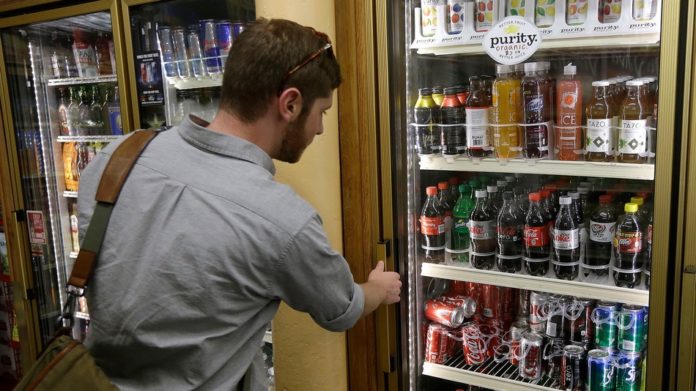The high-stakes battle over soda taxes in the Bay Area

Voters in San Francisco and Berkeley will decide Tuesday whether to pass what would be the nation’s first taxes aimed specifically at sodas and other sugary beverages — the vanguard of a nationwide effort to curb soda consumption through public policy.
In San Francisco, Proposition E would levy a two-cents-per-ounce tax on nonalcoholic beverages with caloric sweeteners. Across the bay in Berkeley, Proposition D would hit sweetened beverages with a penny-per-ounce tax.
San Francisco’s proposal needs approval from two thirds of voters to pass because of its status as a “special tax” — that is, one with revenue set aside for a specific purpose. Berkeley’s requires a simple majority of 50%.
The soda industry has poured more than $11 million into fighting both measures through a Political Action Committee organized by the American Beverage Association, an industry group that includes such giants as Coca-Cola Co., Pepsi Co. and Dr. Pepper Snapple Group. Supporters of each measure have raised just a small fraction of this amount — $441,000 in Berkeley and $275,000 in San Francisco. Much of that came from private donors, national healthcare organizations, local hospitals and medical professionals.
The tax would apply to any nonalcoholic drink with added sugar, although there are a few exceptions. Non-diet soda, energy drinks, iced tea and sports drinks like Gatorade or Vitamin Water would all fall under the tax’s purview, but not milk products, meal replacement drinks, instant formula or (in San Francisco) any drinks prepared one at a time.
Beverages with less than two calories per ounce in Berkeley, and 25 calories per 12-ounce drink in San Francisco, would also escape taxation.
So far more than 30 attempts to tax soda have failed in states and cities across the United States, including a proposal in another Bay Area city, Richmond. But hopes are high that this region, considered one of the most liberal in the United States, could be home to the first.
“If a soda tax can’t pass in the most progressive city in America, it can’t pass anywhere,” Robert Reich, a vice chancellor at UC Berkeley and a former U.S. Secretary of Labor wrote in an op-ed in September. “Big Soda knows that, which is why it’s determined to kill it here.”
Supporters hope that if one of the taxes does pass, it will breathe new life into movements across the country. Maureen Erwin, a consultant for the San Francisco campaign, says it is only a matter of time before soda taxes become a nationwide reality — much like taxes that target tobacco or alcohol.
“All it takes is one, and the dominoes are going to start falling. Right now, it’s just a matter of how soon,” Erwin told Mashable.
Roger Salazar, a spokesperson for both “no” campaigns, told Mashable that he is confident that the proposition will fail in San Francisco, but admitted the race is much tighter in Berkeley.
Still, Salazar claims a victory in Berkeley would not necessarily mean much to the rest of the country. “Berkeley isn’t like the rest of America, so it might not have any national implications beyond what happens at the local level,” Salazar said.
Sara Soka, manager of Berkeley’s “yes” campaign, said just the opposite. Berkeley’s status as a bastion of progressive politics makes it a leader in social movements that other local governments look to for cutting-edge policy, she said. Indeed, Berkeley was the first city in the nation to offer curbside recycling, and also took the lead in smoke-free public spaces.
“Berkeley is looked at as a trendsetter in public health and social movements in general,” Soka told Mashable. “Big Soda knows if they could kill this in Berkeley or San Francisco, it would send a major message for the rest of the country.”
Soka said the she has not been shaken by the $2.4 million the PAC has pumped into the effort to fight her campaign, and she is confident that the movement has wide enough support base to win out against the industry.
More than half of the money funding the “yes” campaign in Berkeley came from former New York City mayor Michael Bloomberg, who fought his own battle with the soda industry as mayor when he tried to impose a citywide ban on super-sized drinks.
Bloomberg also contributed over $10 million to a successful campaign to tax sugary beverages in Mexico, which went into effect this year. Bloomberg kicked in over $200,000 to the campaign and ran TV ads during the World Series supporting the measures.
Salazar argued that the tax will have a disproportionate effect on low-income populations who are more likely to consume soda, a claim that is backed up by a study commissioned by the “no” campaigns. The “no” campaigns are also supported by various local businesses, which argue that the tax will be bad for the cities’ economies, and the Libertarian Party of San Francisco, which argues that people should have a choice about what they put into their bodies.
Soda tax proponents say the tax is simply another “sin tax,” such as those levied against tobacco and alcohol; they cite medical studies that link soft drinks with high rates of obesity and diabetes in the United States. The “yes” campaigns are backed by the American Heart Association and the Center for Science in the Public Interest.
There’s plenty of evidence that they’re right. Reports show that Mexico’s national soda tax has significantly cut down on the amount of soda consumption in the country. Various studies show that higher soda prices do mean lower soda consumption — though not necessarily less obesity.
Have something to add to this story? Share it in the comments.
